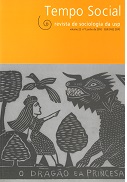Theater, gender and society (1940-1968)
DOI:
https://doi.org/10.1590/S0103-20702010000100002Keywords:
São Paulo, Intellectuals, Acresses, Jorge Andrade, DramaturgyAbstract
Grasping the relations between the city, intellectual life, the university and the theater through the prism of the social history of culture and gender relations requires close attention to the characteristics of social experience and its retranslation into specific symbolic forms. Whilst the relationship between theater, the university and the city signaled diverging paths in some contexts, in others those routes converged in formal and social similarities, as I hope to show in this paper by analyzing the situation in São Paulo during the 40s and 50s - a time that saw the implementation of a cultural system without precedent in Brazilian history. Hence the decision to juxtapose two distinct experiences, those of theater and intellectual output, in order to underscore the sociological warp that aligned them synchronically in the same cultural weft.Downloads
References
ARRUDA, Maria Arminda do Nascimento. (2001), Metrópole e cultura: São Paulo meio de século. Bauru, Edusc.
AUERBACH, Erich. (2007), “La cour e la ville”. In: _____. Ensaios de literatura ocidental. São Paulo, Duas Cidades.
BOURDIEU, Pierre & DELSAUT, Yvette. (1975), “Le couturier et sa griffe: contribuition à une théorie de la magie”. Actes de la Recherche en Sciences Sociales.
BRANDÃO, Tânia. (1988), Peripécias modernas: Companhia Maria Della Costa. Rio de Janeiro, tese de doutorado em História, UFRJ, 2 vols.
_____. (2002), Teatro dos Sete: a máquina de repetir e a fábrica de estrelas. Rio de Janeiro, 7 Letras.
CORRÊA, Mariza. (2003), Antropólogas e antropologia. Belo Horizonte, Editora da UFMG.
EULETÉRIO, Maria de Lourdes. (2005), Vidas de romance: as mulheres e o exercício de ler e escrever no entresséculos, 1890-1930. Rio de Janeiro, Topbooks.
FARIA, João Roberto. (2006), “Entrevista concedida a Nelson de Sá”. Folha de S. Paulo, Suplemento Mais, 30 abr.
MAGALDI, Sábato. (1986a), “Um painel histórico: o teatro de Jorge Andrade”. In: ANDRADE, Jorge. Marta, a árvore, o relógio. 2. ed. São Paulo, Perspectiva.
_____. (1986b), “Dos bens ao sangue”. In: ANDRADE, Jorge. Marta, a árvore, o relógio. 2. ed. São Paulo, Perspectiva.
MATTOS, Davi José Lessa. (2002), O espetáculo da cultura paulista: teatro e TV em São Paulo, 1940-1950. São Paulo, Códex.
MELLO E SOUZA, Gilda de. (1980), “Teatro ao sul”. In: _____. Exercícios de leitura. São Paulo, Duas Cidades.
MONTENEGRO, Fernanda. (1998), Viagem ao outro: sobre a arte do ator. Rio de Janeiro, Fundacen.
NAPOLITANO, Marcos. (2001), “A arte engajada e seus públicos, 1955-1968”. Estudos Históricos, 28, jun.
OLIVEN, Ruben. (2001), “Cultura e modernidade no Brasil”. São Paulo em Perspectiva, 15 (2), abr.-jun.
PONTES, Heloisa. (2004), “Ciudades e intelectuales: los ‘neoyorquinos’ de Partisan Review y los ‘paulistas’ de Clima entre 1930 y 1950”. Prismas, Revista de Historia Intelectual, Buenos Aires, ano 8 (8): 183-204.
_____. (2008), Intérpretes da metrópole: história social e relações de gênero no teatro e no campo intelectual, 1940-1968.
Campinas, tese de livre-docência, Departamento de Antropologia, Unicamp.
_____. (no prelo), “Campo intelectual, crítica literária e gênero (1920-1968)”. In: ALTAMIRANO, Carlos (org.), Historia de los intelectuales en América Latina. Buenos Aires, Katz Editores.
PRADO, Décio de Almeida. (1986), “A moratória”. In: ANDRADE, Jorge. Marta, a árvore, o relógio. 2. ed. São Paulo, Perspectiva.
_____. (1988), O teatro brasileiro moderno. São Paulo, Perspectiva.
PRADO, Luis André do. (2002), Cacilda Becker: fúria santa. São Paulo, Geração Editorial.
RATTO, Gianni. (1996), A mochila do mascate. São Paulo, Hucitec.
RIDENTI, Marcelo. (2000), Em busca do povo brasileiro: artistas da revolução, do CPC à era da TV. Rio de Janeiro, Record.
SCHORSKE, Carl. (1998), “Grace and the word: Austria’s two cultures and their modern fate”. In: _____. Thinking with history: explorations in the passage to modernism. Princeton University Press.
_____. (1993), Viena fin-de-siècle: política e cultura. São Paulo, Companhia das Letras.
SCHWARZ, Roberto. (1978), “Cultura e política, 1964-68”. In: _____. O pai de família e outros estudos. Rio de Janeiro, Paz e Terra.
SFATT, Dina & CABALLERO, Mara. (1988), Dina Sfat: palmas pra que te quero. 2 ed. Rio de Janeiro, Nórdica.
Downloads
Published
Issue
Section
License
Copyright (c) 2015 Tempo Social

This work is licensed under a Creative Commons Attribution-NonCommercial 4.0 International License.


